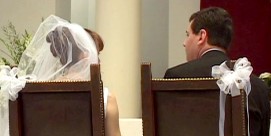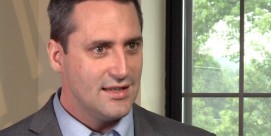FATHER JAMES HALSTEAD (DePaul University, Chicago): Marriage has a specific definition a union of a man and of a woman for life, a lifelong commitment, that’s open to the procreation and education of children and the mutual enrichment of the spouses, conjugal happiness, conjugal life together. All things have to be there for a natural, as well as a covenantal marriage.
The Bible’s always interpreted and in the interpretation of the Bible and the emphasis that you put in certain texts in the Bible, that’s gonna give a unique flavor to the different Christian understandings of marriage. And so as Catholics read and have interpreted Genesis the Second Chapter indissolubility is there.
As we read Mark’s Jesus saying absolute indissolubility of the marital bond is there. And then some of the Greco Roman philosophers, especially the stoics were also and to, and reaction against their culture and in their religious thought, they also said there is this natural human reality called marriage and its characteristics are the heterosexual couple, indissolubility for the purpose of mutual happiness and children.
To go to a civil court and get a divorce is sometimes necessary for the well-being of all involved and therefore you go do it. It can help do some things with financial situations, children, protection of children well-being of, of individual spouses, divorce regretful, regrettable, but sometimes humanly necessary. That’s a different thing than remarriage after divorce. So civil divorces yeah, sometimes needed.
We say, “you’re still a full member of the Church, however, you’re also in a state of grievous sin and so don’t go to communion, but you are a member of the Church. So please raise your children Catholic continue to pray, continue to celebrate sacraments with us, continue to sing, contribute to donate and...but don’t go to communion, because you’re in a state of serious sin, adultery,” and you root that statement, and you’re in adultery, back there in the Christian scriptures, the Jewish section as well as the Christian section.
If you believe, as we do, that marriage validly entered into, properly entered is permanent for life and the bond cannot be broken, well, you’re not free to marry. An annulment is a decree that says that a valid marriage was never entered into in the first place, okay? A valid sacrament never existed, a valid marriage never existed in the first place and therefore the people are free to marriage. In the official (inaudible 11:04:33) commentaries it’s we value marriage so highly and we value the tradition of marriage, we value the word of people who entered into marriage, we value it so highly that to denigrate it in any way is not a good thing at all and so if you’re going to remarry we need a declaration that says that a valid marriage never existed in the first place.
Here’s the thing that I’ve learned in my 39 years of doing marriages, as well as teaching here, the American post enlightenment contractual idea of marriage, that is marriage is what we decide it is an incredibly powerful idea that haunts the minds of American Catholics.
The marriage is a contract and the contractors are the bride and groom, I suppose the State gets thrown in just a little bit, but not very much, but marriage is what we make it to be, a contractual notion of marriage. The Roman Catholic tradition is, “no, you’re participating in something bigger than you are, that is a natural institution created by God in the beginning sanctified by Christ a sacrament, and you’re part of it. You didn’t invent it and it’s not yours to make whatever you want.” That’s a colorful conversation when you do premarital counseling.
I would say, “your Holiness we have a major problem on our hands.” We need to develop people, some of whom may also be priests, who can help people, be with people as they deal with the failure of the promises they originally made in marriage, deal with the disappointment, the hurt, the frustration the sense of alienation, the sense of relief, the sense of authenticity, the sense of thank God I’m finally taking some responsibility for my life by getting out of this marriage. We need people to sit down and talk.
And then work through the details and then ask the question, now tell me the Catholic Church would frankly like to have you in the fullness of our life and for some of us that means including communion. How can we work together for your good, for the common good, for your children’s good how do we do this? I realize fully that some of my colleagues say the most merciful thing you can do is tell them that they’re sinners. I understand that and I respectfully disagree.
Most Americans that I especially in a certain age group, that is the under 65 crowd, which I used to be a member of,they are much more into contractual understandings of marriage than covenantal understandings of marriage. And because of that there’s an, an ideological difference, not just an emotional, it’s, it’s an ideological difference.
And young people who are raised very much in a culture of individuality and individualism I tell you, the last three marriages I’ve worked on…all from the parish where I’ve helped on Sunday for decades, one...I’ve watched ‘em grow up, I did the premarital work, I had a great time, they’re wonderful people, and not one of the three were married in the Catholic Church.
They all asked me to do the ceremony, I said, “you know. as I respect your belief and conscience, and I know you respect mine, so I can’t do the ceremony. I wish you well, I’ll be there but we have a different...I support you and love you, but I can’t do the ceremony.”
And so yeah, they’re very much into contractual notions, and believe God was part of their marriage, their love, their family, but the institution of Roman Catholicism had become unmeaningful to them, something was more meaningful. And in their authenticity that’s was what they opted to do.
We are belief bound starting with Jesus, the resurrection of God, but also going to marriage and yeah those beliefs are not always shared by our members. And we’ve not, perhaps not communicated them well perhaps we have communicated them well, but young people and lots of people just believe something different.







